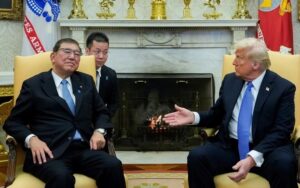A Strategic Partnership Takes Center Stage

In a significant diplomatic and security move underscoring the growing global concern over escalating maritime tensions, Canada and the Philippines formalized a landmark defense agreement this Sunday. Both nations, increasingly vocal critics of China’s assertive and, at times, coercive actions in the disputed South China Sea, signed a crucial pact designed to bolster combat drills and expand their security collaboration. This new alliance aims to establish a stronger, more united deterrent against regional aggression.
The signing of the Status of Visiting Forces Agreement (SOVFA) in Manila marks a pivotal moment in the Indo-Pacific strategy. It aligns Canada, a key member of the Western security bloc, with the Philippines’ determined effort to modernize its security architecture and confront the challenges posed by a militarily superior China within its own exclusive economic zone.
The Legal Framework for Enhanced Interoperability
The SOVFA provides the essential legal framework that governs the presence and activities of visiting Canadian troops for joint large-scale exercises on Philippine soil, and vice versa. This framework is crucial for ensuring smooth logistics, legal clarity, and enhanced interoperability between the two armed forces.
Philippine Defense Secretary Gilberto Teodoro Jr. and his Canadian counterpart, David McGuinty, finalized the agreement following high-level discussions. McGuinty emphasized that the pact will significantly enhance joint military training, improve information-sharing, and strengthen cooperation in responding to complex emergencies, including humanitarian assistance and disaster relief (HA/DR) missions—a critical area given the Philippines’ vulnerability to natural calamities.
For Manila, the message behind the signing was unambiguous. Secretary Teodoro explicitly condemned China’s actions, stating that the agreement is key to upholding a rules-based international order in a region where one power is seemingly determined to challenge it.
“Who is hegemonic? Who wants to expand their territory in the world? China,” Teodoro remarked to reporters, directly linking the new defense pact to the need for collective security against perceived territorial expansionism.
The Philippines’ Strategic Pivot
The defense pact with Canada is a cornerstone of President Ferdinand Marcos Jr.’s broader strategy to actively seek defense ties with like-minded countries. Recognizing the inherent limitations of the Philippines’ underfunded military in directly confronting China, Marcos Jr. has engineered a significant diplomatic pivot towards strengthening alliances.
The SOVFA with Canada represents the third such agreement signed under the Marcos administration, following similar defense arrangements with Japan and New Zealand. This swift expansion of security alliances signals Manila’s resolve to build a “lattice of security partnerships” across the Indo-Pacific. Furthermore, Philippine officials have confirmed that negotiations for similar agreements are currently underway with France and Singapore, with efforts also proceeding to launch talks with the United Kingdom, and potentially with Germany and India. This concerted effort is transforming the Philippines from a bilateral defense partner (primarily with the U.S.) into a central hub for multilateral security cooperation in the region.
The Looming Shadow of the South China Sea Dispute
The impetus for these strengthened alliances is the unceasing and often dangerous aggression displayed by Beijing in the disputed waterway. China lays claim to the South China Sea—a vital global trade route—almost in its entirety, a claim that was emphatically invalidated by a 2016 arbitration ruling based on the 1982 U.N. Convention on the Law of the Sea (UNCLOS). Beijing has consistently dismissed this ruling.
Recent incidents have brought the volatility of the region into sharp focus:
Coercive Tactics: China has employed powerful water cannons and engaged in dangerous blocking maneuvers against Philippine coast guard and supply vessels, resulting in collisions, damage to ships, and injuries to Filipino crew members.
Wider Disputes: The territorial claims are not limited to Manila; Vietnam, Malaysia, Brunei, and Taiwan are also embroiled in the long-simmering disputes, further complicating regional stability.
The tensions prompted immediate condemnation from Western allies. Just this Saturday at the annual meeting of ASEAN defense ministers, Secretary Teodoro strongly criticized China’s recent announcement regarding the establishment of a “nature reserve” in the Scarborough Shoal—a rich fishing ground claimed by both Manila and Beijing.
“This, to us, is a veiled attempt to wield military might and the threat for use of force, undermining the rights of smaller countries and their citizens who rely on the bounty of these waters,” Teodoro stated, framing the environmental claim as a security threat.
Canada’s Clear Stance and Technological Support

Canada has been unambiguous in its support for Manila and its criticism of Beijing’s actions. Canadian Ambassador to Manila, David Hartman, has previously stated that his country has “been vocal in confronting the provocative and unlawful actions” of China and will continue to do so.
In a practical demonstration of support, the partnership extends beyond traditional military cooperation. A 2023 agreement signed in Ottawa granted the Philippines access to data from Canada’s sophisticated “Dark Vessel Detection System.” This advanced satellite technology is designed to track illegal vessels, even those that attempt to evade detection by switching off their location-transmitting devices.
The Philippine coast guard has already utilized this crucial Canadian technology to monitor the activities of Chinese coast guard ships and fishing vessels in the South China Sea, providing greater transparency and situational awareness in the contested areas. Canada had also publicly criticized Beijing’s plan for the Scarborough Shoal in September, declaring its opposition to “attempts to use environmental protection as a way to take control” of the shoal.
Regional Repercussions and the Silent Response from Beijing
The increased military cooperation between the Philippines and Western nations like Canada and the United States has drawn sharp criticism from China. Beijing has often labeled Manila a “troublemaker” and a “saboteur of regional stability” following joint patrols and combat drills.
However, immediately following the signing of the SOVFA, there was no immediate public comment from China. Their silence, however, is unlikely to signal acceptance. The escalating patrols, drills, and the tightening network of alliances represent a direct counter-strategy to Beijing’s regional assertiveness.
The new defense pact between Canada and the Philippines is a clear manifestation of a collective security strategy in the Indo-Pacific. It’s a powerful statement that Western nations are not merely observers but active participants committed to promoting the rule of law, freedom of navigation, and regional stability, even as China seeks to reshape the maritime order to its advantage. This alliance signals a future where the security landscape of the South China Sea will be defined not by unilateral coercion, but by multilateral cooperation and shared democratic values.





